Putin criticized the European energy policy from Sofia
Ralitsa Kovacheva, November 15, 2010
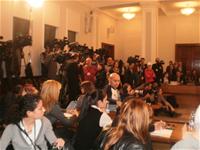 After more than 5 hours waiting for answers about the fate of the Bulgarian-Russian energy projects, ultimately journalists left the joint press conference of Prime Ministers Putin and Borissov with few news and more questions.
After more than 5 hours waiting for answers about the fate of the Bulgarian-Russian energy projects, ultimately journalists left the joint press conference of Prime Ministers Putin and Borissov with few news and more questions.
What we know for sure is that Bulgaria and Russia have signed a Shareholders' Agreement and Articles of association of the South Stream Bulgaria joint project company established on an equal basis for the implementation of the South Stream project in Bulgaria. So far, Bulgaria was delaying this concrete step because South Stream is seen as a competitive to the European project Nabucco, in which the country is also participating. Has anything changed?
Russian Prime Minister Vladimir Putin took advantage of a question from 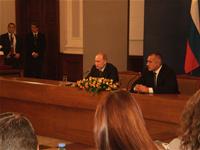 the Interfax news agency about how the so-called Third energy package would affect the realisation of the South Stream and the negotiations over gas prices, to criticize the European energy policy from Sofia. Putin warned, that without Gazprom the development of EU's energy infrastructure would be delayed and energy prices would remain high:
the Interfax news agency about how the so-called Third energy package would affect the realisation of the South Stream and the negotiations over gas prices, to criticize the European energy policy from Sofia. Putin warned, that without Gazprom the development of EU's energy infrastructure would be delayed and energy prices would remain high:
"If, say, big players such as Gazprom are not allowed to build new infrastructure projects, it is perfectly obvious that the development – it refers not only to Gazprom, but also for European companies engaged in extraction - I am convinced that infrastructure development will be delayed. This means that there will be infrastructure constraints of supply to the European market of energy resources, and in terms of limited supplies the energy resources will keep their prices high. So I think at least these proposals need further very serious study."
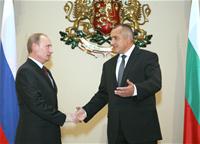 "Moreover, I think not everybody, for instance the consumers in Europe, knows that the greater is a consumer, the less it will pay for the consumed gas at the end. In the pricing structure for large users the price of our gas is about 50%. The structure of the price for small customers, including households, citizens, this component is much larger. This means that big players, big stakeholders in business, are able to influence state structures that take decisions. I think in principle it would be fair to allocate the burden among all market participants and all users. And not limit the opportunities for development of infrastructure in the energy sector on the European continent. "
"Moreover, I think not everybody, for instance the consumers in Europe, knows that the greater is a consumer, the less it will pay for the consumed gas at the end. In the pricing structure for large users the price of our gas is about 50%. The structure of the price for small customers, including households, citizens, this component is much larger. This means that big players, big stakeholders in business, are able to influence state structures that take decisions. I think in principle it would be fair to allocate the burden among all market participants and all users. And not limit the opportunities for development of infrastructure in the energy sector on the European continent. "
Bulgarian Prime Minister Boyko Borissov did not comment on the words of his counterpart, nor protected the common energy policy and legislation being the prime minister of an EU member state. Borissov said that everything that happened on Saturday was with the knowledge of the European Commission.
South Stream - a European project?
According to Prime Minister Borissov “Bulgaria is interested in gas supply via both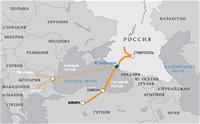 pipelines (possibly the Prime Minister is referring to Nabucco) and I hope for what Mr Putin said, that experts in the European Commission will take account of these facts."
pipelines (possibly the Prime Minister is referring to Nabucco) and I hope for what Mr Putin said, that experts in the European Commission will take account of these facts."
"Moreover, after the European Union acknowledged Russia as a strategic partner, together with Prime Minister Putin we informed the European Commissioner for Energy Mr Oettinger, in order they to acquire their opinion on the Agreement and the statutes of the new company. Moreover, they sent a representative to participate today and to witness the signing, because South Stream is a European project and it will supply gas to many countries in Europe ... "
Russian Prime Minister Vladimir Putin also stressed that the pipeline was of huge European significance. He noted that it had already attracted leading companies from European countries like Italy and France, and there were other proposals for participation.
At this stage it is not known whether the European Commission has changed its attitude toward South Stream. It is known, however, the desire of the Russian side the project to get TEN-E status (to be part of the Trans-European Energy Network), similar to Nord Stream. Indications for such a possibility have already been given by the Energy Commissioner Gunter Oettinger.
 A curious detail is, that, according to the transcript from the meeting between the two government delegations, Putin had made the following statement: "If we bring the South Stream to an end, then we will refrain from implementing the second part of the Nord Stream. If something does not prevent us from doing so, we will look at several options - either to expand our capabilities to Northern Europe, or to make a gas pipeline parallel to the Blue Stream pipeline through Turkey and then on to Greece and Italy. "
A curious detail is, that, according to the transcript from the meeting between the two government delegations, Putin had made the following statement: "If we bring the South Stream to an end, then we will refrain from implementing the second part of the Nord Stream. If something does not prevent us from doing so, we will look at several options - either to expand our capabilities to Northern Europe, or to make a gas pipeline parallel to the Blue Stream pipeline through Turkey and then on to Greece and Italy. "
As you know, Russia is currently constructing the Nord Stream, which has a TEN-E 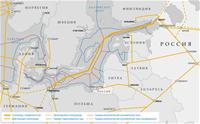 status. Nord Stream is to connect the Baltic sea coast of Russia, near Vyborg, with the Baltic sea coast of Germany, near the town of Greifswald. Its length is 1,224 km. In 2011 the construction of the first pipe of the pipeline will be completed with a capacity of 25 and a half billion cubic meters of gas annually. In 2012 the second line must be built to double the capacity of the pipeline. This is exactly the stage of the project that was questioned in Putin's statement.
status. Nord Stream is to connect the Baltic sea coast of Russia, near Vyborg, with the Baltic sea coast of Germany, near the town of Greifswald. Its length is 1,224 km. In 2011 the construction of the first pipe of the pipeline will be completed with a capacity of 25 and a half billion cubic meters of gas annually. In 2012 the second line must be built to double the capacity of the pipeline. This is exactly the stage of the project that was questioned in Putin's statement.
Few specifics, many uncertainties
Although the two prime ministers announced almost none concrete facts about the project, a statement of Alexey Miller, Chairman of Gazprom's Management Committee, made it clear that South Stream in Bulgaria would be built entirely with new pipes. As you know, there was an option the existing Bulgarian transit pipelines to be used for the project. It is not clear what will be the price of the project, nor how Bulgaria will finance it.
According to Miller, Gazprom is ready to finance the operation of the joint company at the first stage. Minister of Economy and Energy Traycho Traykov, however, clarified that this would be an option for Bulgaria only if it came to funding "without government guarantees and without a pledge of our participation." According to Minister Traykov, the cost of the project will become clear in the first quarter of next year, but the initial estimations point at a price of some 800 million euro, as the Bulgarian part would be half that amount.
With regard to potential benefits for Bulgaria, there was discrepancy in the figures given by the two Prime Ministers:
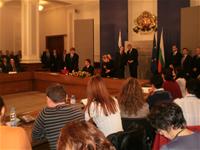 Boyko Borisov: "By signing today's agreement for South Stream, the governments of Bulgaria and Russia will receive more than 2 billion dollars in their budgets in the next five or six terms, depending on the quantities of gas that flow through the pipes."
Boyko Borisov: "By signing today's agreement for South Stream, the governments of Bulgaria and Russia will receive more than 2 billion dollars in their budgets in the next five or six terms, depending on the quantities of gas that flow through the pipes."
Vladimir Putin: "For this transit Bulgaria will have 2.5 billion dollars yearly, more precisely 2.4.”
About the price of the Belene NPP
It turned out that the Russians came to Sofia with a final offer for the construction of the second nuclear power plant Belene, which obviously did not satisfy the Bulgarian side. Therefore, Prime Minister Putin, although he announced to the media that he was ready to name the price immediately, he refrained from doing so. The Energy Minister Traycho Traykov explained later, that Russia had proposed a final price of 6.3 billion euro, while the Bulgarian expectations were the current price of nearly 4 billion euro not to go over 5 billion.
According to Prime Minister Borisov, the deal is "the experts to reach the lowest price, given highest security for the NPP in Europe is guaranteed, i.e. one of the best plants in Europe to be built in Bulgaria." By the end of the year Belene's technical project will be approved, Putin said and stressed that Russia treats "with respect and understanding the position of the Bulgarian Prime Minister, who insists the project to be a common European one. The Russian side is ready to realise it in a way, as favourable as possible for our Bulgarian partners, providing the necessary credit resources, equipment, attracting local companies and other European companies in areas where they appear uncontested leaders, providing also fuel supply and utilization.”
As for the European partners, at the delegations' meeting Putin stated: "We have very good relations with several European partners, primarily with Siemens and Areva of France, but mainly we are working with Siemens." It was Siemens that was mentioned as a likely European investor in the project.
In their comments to the media in Sofia all Russian officials emphasized Russia's readiness to finance the construction of Belene NPP. According to Sergey Kirienko, Director General of Rosatom, the company is prepared to provide the necessary loans for the construction of Belene NPP and more - to become a strategic investor.
"We are ready to be a shareholder in the project, but we do not insist. We treat with understanding the Bulgarian position, which is that, since Russia is building the power plant, it should not have the controlling stake."
Regarding the gas prices, Prime Minister Putin explicitly stated, that the South Stream project has nothing to do with gas prices, which are determined on market principles rather than administratively. So this issue should be left entirely to the negotiations between BEH (Bulgarian Energy Holding) and Gazprom. A day later, however, Boyko Borisov said:
"The price of gas will fall. But because it is a matter of relations between two commercial companies, 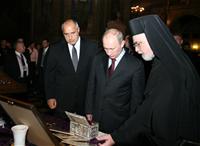 they fear that if the countries begin to reduce gas [prices] one by one, all will eventually go and ask for reductions. So we have agreed not to talk, the price is falling and will continue to fall.”
they fear that if the countries begin to reduce gas [prices] one by one, all will eventually go and ask for reductions. So we have agreed not to talk, the price is falling and will continue to fall.”
Is there a Bulgarian capitulation?*
According to Prime Minister Borissov, such wording must remain in history, because now the Bulgarian-Russian relations are based on an entirely pragmatic and mutually beneficial basis. As Borissov said during the meeting of the two delegations, "You have gas, that's why we exchange gas for tourism. That's why we do the "South Stream" with Russia not with Qatar. "
 Asked what kind of compromises had been made by both sides in order the agreement on South Stream to be reached, Putin reacted with the genuine astonishment of a man who is hearing this word for the first time ever: "I do not understand what kind of compromises you are talking about!" The good relations between the two Prime Ministers were illustrated with a puppy, a present from Borissov for Putin. As Alexey Miller said (not without satisfaction) to Russian media, "South Stream" has confidently stepped in Europe."
Asked what kind of compromises had been made by both sides in order the agreement on South Stream to be reached, Putin reacted with the genuine astonishment of a man who is hearing this word for the first time ever: "I do not understand what kind of compromises you are talking about!" The good relations between the two Prime Ministers were illustrated with a puppy, a present from Borissov for Putin. As Alexey Miller said (not without satisfaction) to Russian media, "South Stream" has confidently stepped in Europe."
The conclusion is that although slowly and in the dark – both the South Stream and Belene NPP are happening. And what has not happened yet, will happen.
In Sofia Russian energy Minister Sergei Shmatko thanked Borissov for the wonderfully presented Russian pop music and Russian culture for the 65th anniversary of the victory over fascism in Bulgaria. Borissov replied: "Bolshoi Theatre also visited. If not, it will visit."
*capitulation was the word used by a Russian newspaper ahead of the signing ceremony on Saturday in Sofia
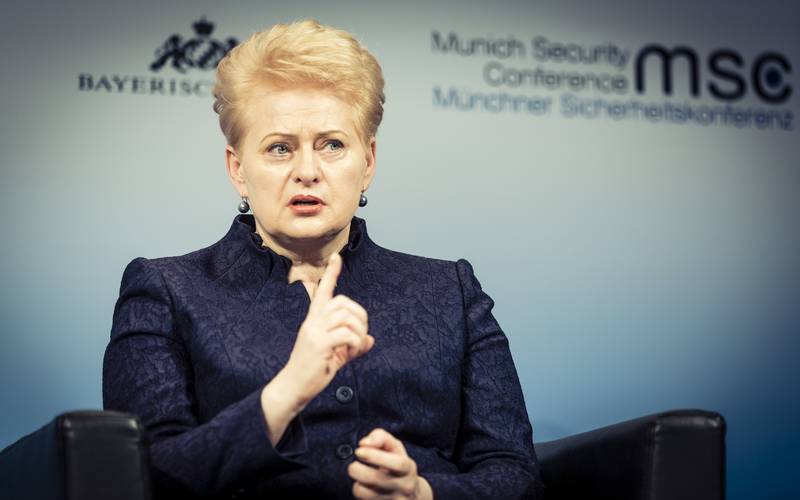 Dalia Grybauskaite | © MSC/Koerner
Dalia Grybauskaite | © MSC/Koerner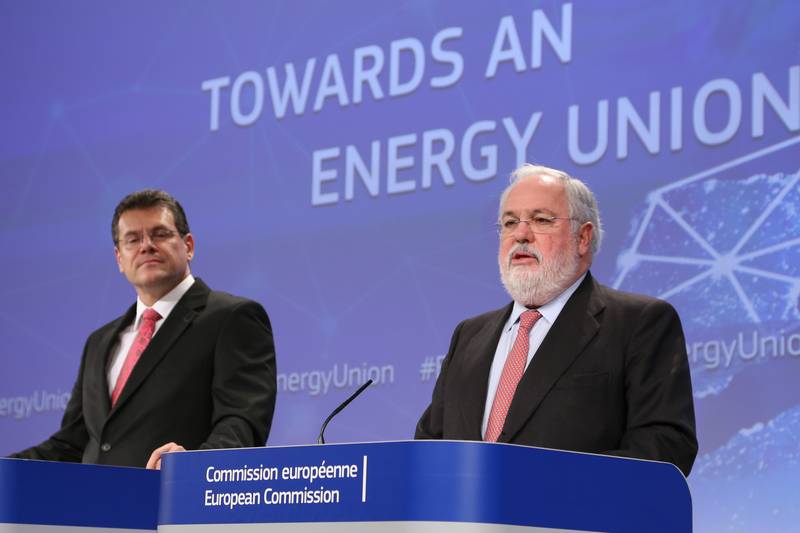 Maros Sefcovic, Miguel Arias Canete | © European Commission
Maros Sefcovic, Miguel Arias Canete | © European Commission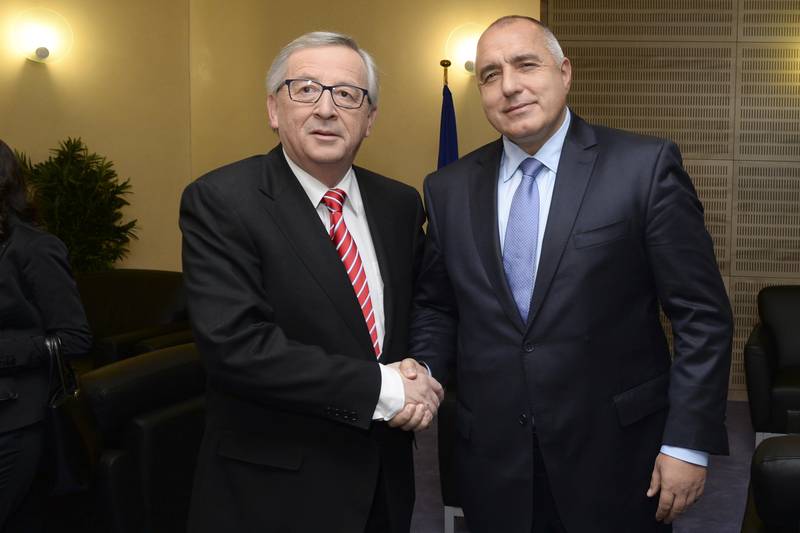 Jean-Claude Juncker, Boyko Borissov | © European Commission
Jean-Claude Juncker, Boyko Borissov | © European Commission